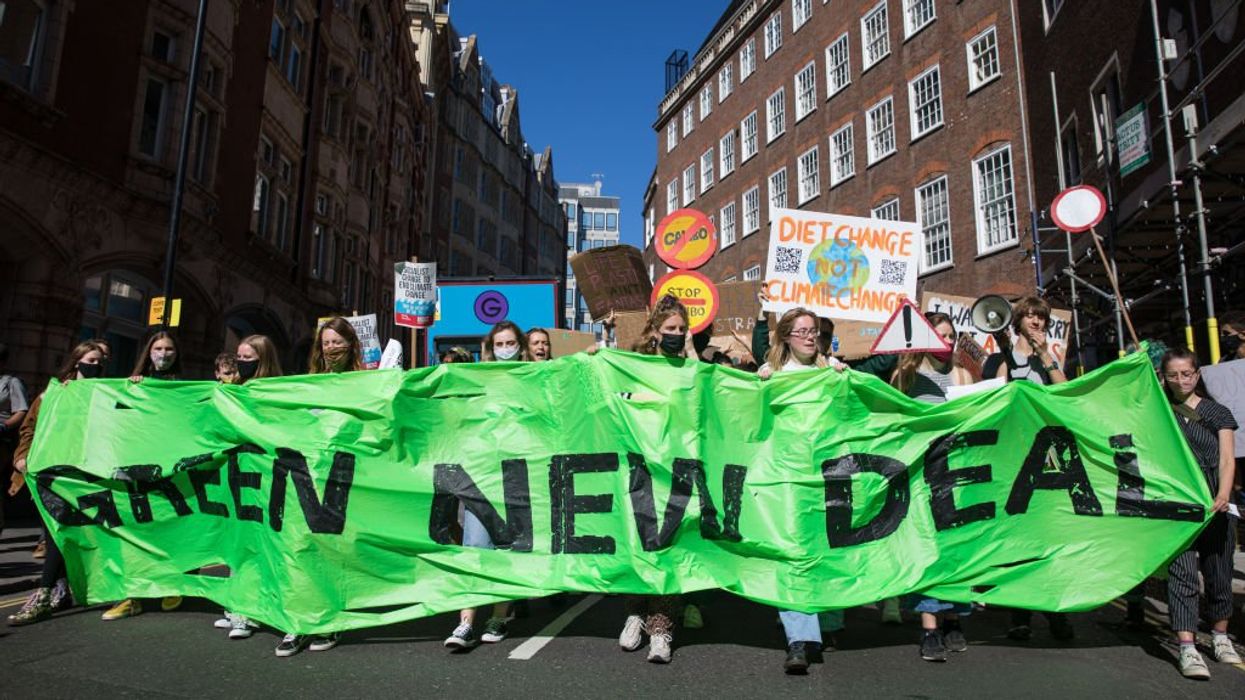
Mark Kerrison / Contributor via GettyImages

Regarding the debt ceiling negotiations, the New York Times reported, “Mr. McCarthy’s negotiators gave Biden officials the impression that to reach agreement, they needed at least one talking point from every major aspect of the House Republican debt limit bill.” That is, except for one critical item for which conservatives didn’t even secure a talking-point provision. Absolutely nothing was done to address the estimated $1.2 trillion in green energy subsidies — the lion’s share of which will go to electric vehicles.
The ungodly sums of money our government is shoveling into the electric vehicle industry will never make them safe, efficient, or cost effective, but it will be enough to continue the incentives for manufacturers to reduce supply for real automobiles, boxing out the middle class from the American dream. Unless Republicans double down on a repeal of the green new deal in the appropriations process, middle-class America will not only lose access to normal cars, but our entire fragile energy system and electric grid will fail.
Despite all the headwinds the petroleum industry faces, the headwinds against electricity by the same eco-fascists, ironically, make cars more expensive to recharge than to fuel. This, according to the U.K. Daily Mail:
Oil giants BP and Shell – which oversee the UK's biggest recharging networks – charge 79p and 85p per kWh respectively. In May 2022 you could recharge at a rate of 44.55p per kWh.
Meanwhile, the price of petrol has dropped to around 144p a litre, meaning it costs £72 to fill up a typical car. As a result, the cost per mile for the electric VW ID.3 is 21.43p compared to 13.03p for VW's petrol equivalent the Golf 1.5L, according to The Sun.
And this will only get worse as leftist legistlators crush traditional forms of electricity and make the electric grid more fragile. This is also on top of citizens needing to pay so much more for the EV itself.
Moreover, so many of the public EV chargers, which you inevitably need when going on a road trip, don’t even work. According to a survey from JD Power and Associates, 21.5% of all EV drivers complained they were unable to successfully recharge at a public station. Another survey found that about 25% of the 657 plugs in the San Francisco Bay area weren’t working in 2022. As Bloomberg notes, there is no lack of potential failure mechanism for charging ports. "Parts break, information screens freeze, payment systems malfunction. Copper thieves steal the cords.”
Maintaining the green new deal will make the industry solvent enough to perpetuate its insolvency indefinitely rather than allowing it to immediately collapse as it would without more subsidies and a tendentious regulatory structure requiring manufacturers to make a certain percentage of their fleets EVs. As Prof. Kurt Lauk, a German automobile manager, recently warned, all this will accomplish is handing 80% of the car market to China and boxing out the bottom 50% of income-earners from ever affording a car.
Jeep owner Stellantis already warned that it will be sending fewer gasoline-powered SUVs to car dealers in blue states with EV mandates like California. “In some circumstances, we may be compelled to allocate more electrified powertrain vehicles to California states” to “comply with the more stringent standards being enforced in the California States,” the Stellantis memo says. This will have the effect of further diminishing supplies and driving up the cost of normal vehicles.
The twisted irony is that production of EVs is much worse for the environment than traditional cars. Mark Mills of the Manhattan Institute perfectly sums up the counterproductive nature of EV production against the stated goal of saving the environment and even reducing so-called CO2 emissions:
To match the energy stored in one pound of oil requires 15 pounds of lithium battery, which in turn entails digging up about 7,000 pounds of rock and dirt to get the minerals needed—lithium, graphite, copper, nickel, aluminum, zinc, neodymium, manganese, and so on. Thus, fabricating a typical, single half-ton EV battery requires mining and processing about 250 tons of materials. (These figures hold roughly true for all lithium chemistries.) For the carbon-counters tracking such things, the global mining and minerals sector uses 40 percent of all industrial energy—dominated by oil, coal, and natural gas—and that’s before we take into consideration the massive expansion that would be required to supply all the battery factories planned for widespread EV adoption.
And of course, almost all that production is dominated by China. The same Biden administration that obsesses with EV batteries is doing everything it can to shut down mining of critical materials needed for EVs in the U.S.
So, after grifting for China and a handful of well-connected companies to box Americans out of the American automobile industry and stick the wealthy with EVs at a painful cost, these policies will then crash our electric grid. There is no way our electric grid can handle this proposed surge in use of EVs precisely because of the other maniacal green new deal policy transitioning our grid to solar and wind.
This is why Republicans cannot let go of this issue. House appropriators must completely defund the green new deal in the appropriation bills and work to overturn the Biden executive order mandating that two-thirds of cars be EVs by 2032. We cannot wait until 2025 to save the American automobile.